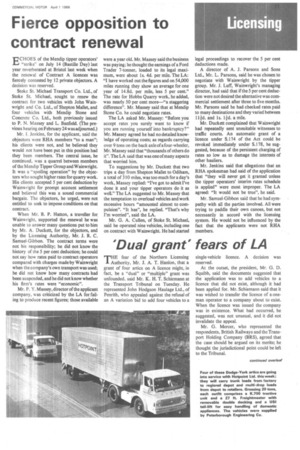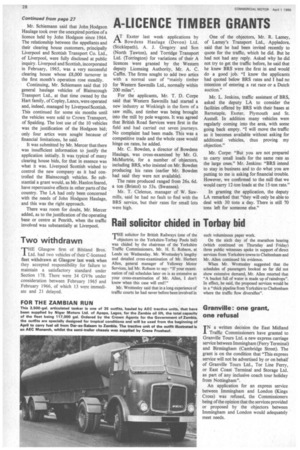"Dual grant' fears of LA
Page 29

Page 30

If you've noticed an error in this article please click here to report it so we can fix it.
THE fear of the Northern Licensing Authority, Mr. J. A. T. Hanlon, that a grant of four attics on A licence might, in fact, be a "dual" or "multiple" grant was unfounded. said Mr. K. H. T. Schiemann at the Transport Tribunal on Tuesday. He represented John Hodgson Haulage Ltd., of Penrith, who appealed against the refusal of an A variation bid to add four vehicles to a single-vehicle licence. A decision was reserved.
At the outset, the president, Mr. G. D. Squibb, said the documents suggested that the application was to add vehicles to a licence that did not exist, although it had been applied for. Mr. Schiemann said that it was wished to transfer the licence of a oneman operator to a company about to exist. When the licence was issued the company was in existence. What had occurred, he suggested, was not unusual, and it did not invalidate the appeal.
Mr. G. Mercer, who represented the respondents, British Railways and the Transport Holding Company (BRS), agreed that the case should be argued on its merits; he thought the jurisdictional point could be left to the Tribunal. Mr. Schiemann said that John Hodgson Haulage took over the unexpired portion of a licence held by John Hodgson since 1964. The relationship between the appellants and their clearing house customers, principally Liverpool and Scottish Transport Co. Ltd., of Liverpool, were fully disclosed at public inquiry. Liverpool and Scottish, incorporated in February, 1965, was a very successful clearing house whose 0,000 turnover in the first month's operation rose steadily.
Continuing, Mr. Schiemann said that 10 general haulage vehicles of Blainscough Transport Ltd., at that time owned by the Hart family, of Copley, Lancs, were operated and, indeed, managed by Liverpool Scottish. This continued for some six months until the vehicles were sold to Crown Transport, of Spalding. The lost use of the 10 vehicles was the justification of the Hodgson bid; only four artics were sought because of financial limitations, he said.
It was submitted by Mr. Mercer that there was insufficient information to justify the application initially. It was typical of many clearing house bids, for that in essence was what it was. Liverpool Scottish wished to control the new company as it had controlled the Blainscough vehicles. So substantial a grant would, as Mr. Hanlon feared, have repercussive effects in other parts of the country. The LA had only been concerned with the needs of John Hodgson Haulage, and this was the right approach.
There was room for doubt, Mr. Mercer added, as to the justification of the operating base or centre at Penrith, when the traffic involved was substantially at Liverpool.




















































































































